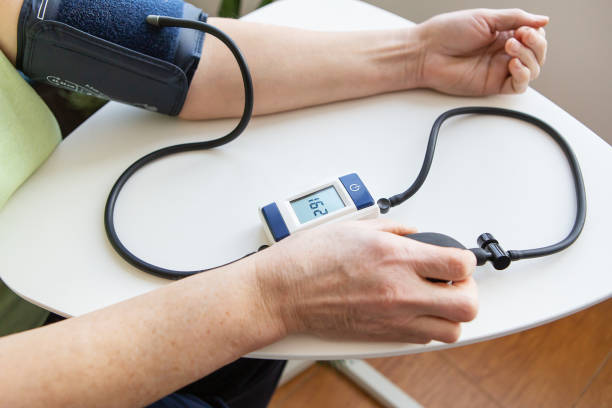Health Conditions
What is Stroke Level Blood Pressure?
Maintaining normal blood pressure is critical for general health. Normal blood pressure is usually around 120/80 mmHg. However, if your blood pressure rises above specific limits, it might have major effects for your health. One such condition is stroke-level blood pressure.
Blood pressure is a measurement of the force exerted by blood against the walls of your arteries as it passes through them. It is indicated by two numbers: systolic pressure (the larger number) and diastolic pressure (the smaller number).
The systolic pressure represents the highest pressure put on the arteries when the heart contracts, whereas the diastolic pressure represents the pressure when the heart is at rest between beats. Blood pressure is measured in millimetres of mercury (mmHg).
What is Stroke Level Blood Pressure?
Stroke level blood pressure is defined as extremely high blood pressure that poses an immediate danger of stroke or other serious health problems. While a single high blood pressure result may not cause immediate concern, repeatedly raised blood pressure readings exceeding 180/120 mmHg suggest stroke-level blood pressure.

Dangers of Stroke Level Blood Pressure
Stroke-level blood pressure places a significant burden on your blood vessels, heart, and other organs. The increased pressure can cause blood vessels to rupture or become blocked, decreasing blood flow to the brain and raising the risk of a stroke. Furthermore, stroke-like blood pressure might harm your kidneys, eyes, and other essential organs.
Without quick medical action, this condition can have disastrous implications, including long-term impairment and even death. Recognizing the signs and obtaining quick medical assistance are critical for reducing the hazards connected with this condition.
Recognizing the Symptoms
While high blood pressure rarely causes visible symptoms, stroke-level blood pressure might occasionally appear with specific warning indications. These symptoms may include severe headaches, visual problems, chest pain, difficulty breathing, dizziness, and weakness or numbness in the face, arms, or legs. If you encounter any of these symptoms, you should seek medical assistance immediately.

Recognizing the Causes
Several factors that influence the development of stroke-related blood pressure. This includes:
- Genetic predisposition: Family history of high blood pressure can increase your risk.
- Unhealthy lifestyle: Poor diet, lack of physical activity, excessive alcohol consumption, and smoking can all contribute to elevated blood pressure levels.
- Chronic conditions: Certain medical conditions, such as kidney disease, thyroid disorders, and sleep apnea, can lead to high blood pressure.
- Age and gender: As you age, the risk of high blood pressure increases. Men are also more likely to develop high blood pressure than women, although this difference diminishes after menopause.
Understanding the underlying causes of stroke-related blood pressure might help you make required lifestyle adjustments and seek appropriate medical therapy.
How is it Diagnosed?
To diagnose stroke-level blood pressure, precise and consistent blood pressure measures are required. Your healthcare professional will take several blood pressure readings over time to establish the diagnosis. They may also run additional tests to assess organ damage or find any underlying causes of your high blood pressure.

Treatment Options
Managing stroke-level blood pressure usually requires a mix of lifestyle changes and pharmacological therapies. Your doctor may recommend drugs to help lower your blood pressure and lower your risk of stroke. These medications could include diuretics, beta-blockers, ACE inhibitors, calcium channel blockers, or a combination of them.
In addition to medicine, leading a healthy lifestyle is critical. This can include:
- Following a balanced diet low in sodium and high in fruits, vegetables, and whole grains.
- Engaging in regular physical activity, such as walking, swimming, or cycling, for at least 150 minutes per week.
- Limiting alcohol consumption to moderate levels or abstaining altogether.
- Quitting smoking and avoiding secondhand smoke.
- Managing stress through relaxation techniques, mindfulness, or seeking professional help if needed.
Lifestyle Changes to Manage Stroke Level Blood Pressure
Sustainable lifestyle changes can have a major impact on your blood pressure and cardiovascular health. By implementing healthy practices into your everyday routine, you can effectively regulate high blood pressure and lower your risk of consequences.

Preventing Stroke Level Blood Pressure
In the case of high blood pressure, prevention is always preferable to treatment. Early adoption of a healthy lifestyle can significantly minimize the likelihood of having stroke-related blood pressure. Preventive interventions include:
- Regularly monitoring your blood pressure.
- Eating a nutritious diet and limiting processed foods high in sodium and saturated fats.
- Engaging in regular physical activity.
- Maintaining a healthy weight.
- Managing stress through healthy coping mechanisms.
- Limiting alcohol consumption.
- Avoiding tobacco use.
Taking preventive efforts to avoid high blood pressure can dramatically reduce the risk of stroke and other problems.
Conclusion
Stroke-level blood pressure is a dangerous condition that necessitates rapid treatment. To effectively manage this condition, you must understand its symptoms, causes, and treatment options. You can lower the chances of stroke by leading a healthy lifestyle, working closely with your healthcare practitioner, and taking recommended medications.
Remember that prevention and early intervention are critical to reducing the impact of this condition on your overall health. Take control of your health by scheduling frequent check-ups and making the necessary changes to live a heart-healthy lifestyle.
Trusted Health, Wellness, and Medical advice for your well-being



